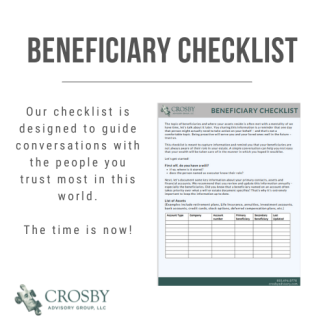
Top 5 Considerations When Naming a Beneficiary
The topic of beneficiaries and where your assets reside is often met with a mentality of we have time, let’s talk about it later. You sharing this information is a reminder that one day that person might actually need to take action on your behalf – and that’s not a comfortable topic. Being proactive will serve you and your loved ones well in the future – trust us.
What is a Beneficiary
Just as it sounds, a beneficiary is the person who will ultimately benefit in the event of your passing. A beneficiary can be things like an individual, multiple people, a trust, and / or a charity. You can name different people as beneficiaries for your various accounts and policies.
Why is a Beneficiary Important
Beneficiary designations take priority over what’s in other estate planning documents, such as a will or trust, so it is critical that they are maintained properly. Often times we choose a beneficiary and they don’t even know it! Your beneficiary should be aware of the information listed below – your assets, any loans, and your key contacts.
We recommend reviewing your accounts annually to ensure your beneficiaries are kept up to date as your life changes. Here are a few key things that you will want to ensure are kept up to date:
- List of assets (examples include: retirement plans, Life Insurance, annuities, investment accounts, bank accounts, credit cards, stock options / restricted stocks, deferred compensation plans)
- Outstanding loan information (examples include: home, vehicle, personal, etc.)
- Power of Attorney (examples include: medical, financial, legal, business, real estate, etc.)
- Important contacts (financial advisor, insurance agent, lawyer, accountant, etc.)
5 Tips for Managing Your Beneficiaries
- Remember to name beneficiaries: If you don’t name a beneficiary, it’s possible your account / policy may have to go through probate. Unfortunately, this process can lead to delays, additional costs, and tax implications.
- Name primary and secondary beneficiaries: When possible, it’s a good strategy to choose a secondary or back-up beneficiary in case the primary beneficiary dies before you.
- Review Annually: We recommend routine reviews of your beneficiaries to reflect life events like births, deaths, marriages, and / or divorces.
- Coordinate with your will and trust: Remember that beneficiaries operate separately from your will and trust. If you update one, be sure to contact your lawyer / financial advisor to ensure your overall estate plan is aligned.
- Be aware of tax consequences: Often assets that transfer via beneficiary have unique tax rules. Work with an advisor who can give you the information you need in order to make these decisions.
We are here to help! Download our checklist to capture information and remind you that your beneficiaries are not always aware of their role in your estate. A simple conversation can help you rest easy that your estate will be taken care of in the manner in which you hoped it would be.

